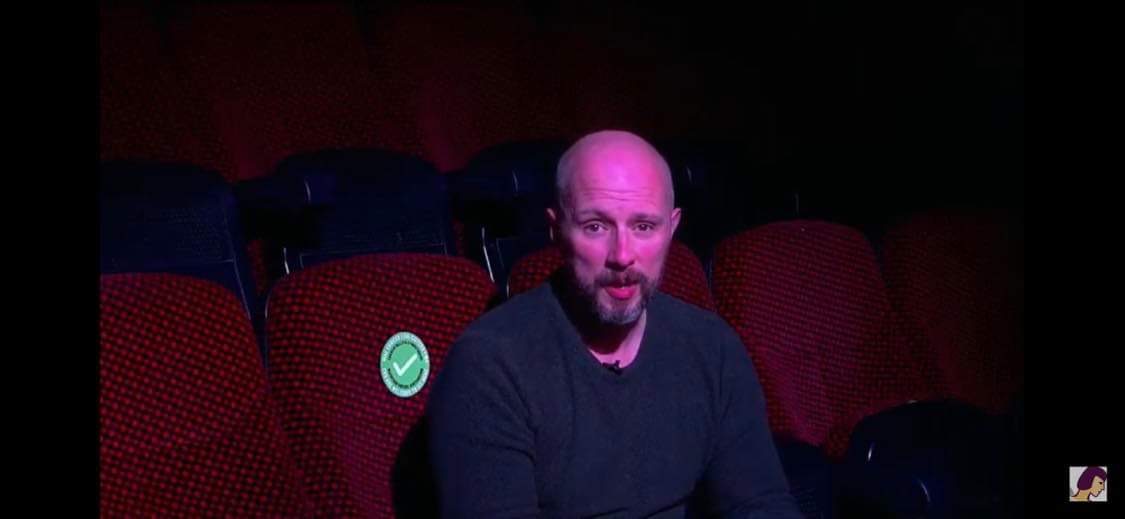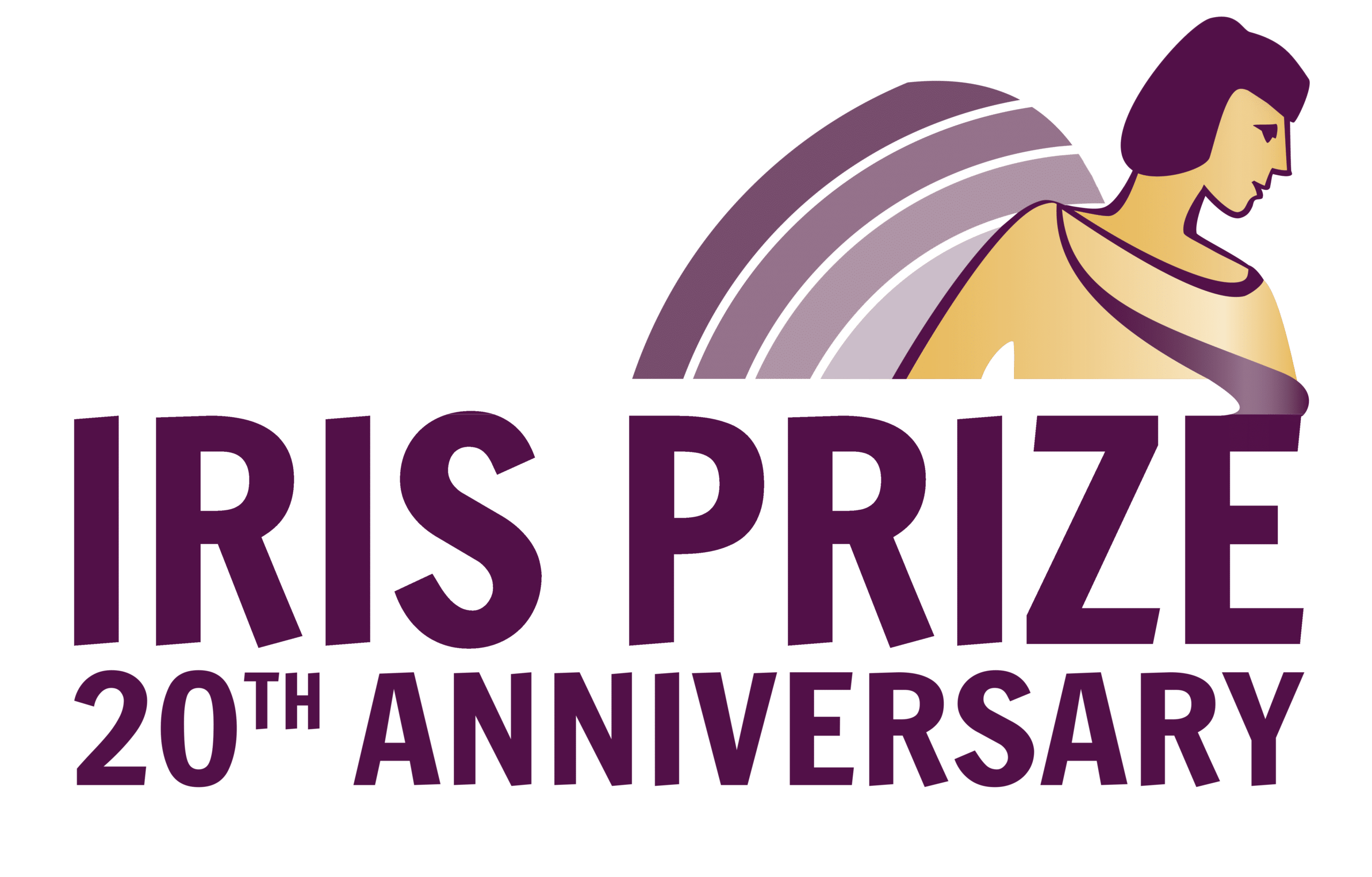And finally with the Iris Blogger
David Llewellyn, is a Welsh novelist and script writer. He has been attending the Iris Prize Festival from day one, year one in 2007. This year he presented a nightly blog, live to close Iris Live! We are delighted to reproduce them here for you to read.

Wednesday 6 October 2020, 7.25pm
Well, this is weird.
2020 marks my 14th Iris Prize Festival. I was there on Day 1, so I’ve seen first-hand how she’s grown and evolved over the years.
Back in 2007 we managed to get all of the guests and jury members and the entire festival team from place to place in two minibuses. The festival lasted three days, and I attended every party and saw every last short film and feature.
But even though each year the festival seems a little bit bigger than before, it’s always Iris. And though saying it’s come to feel like a family may be a cliché, it also happens to be true. Through Iris I’ve made lasting friendships, with some of the loveliest and funniest and most talented people I’ve ever met. No other film festival is quite like it.
It’s the excitement of the first few days I’m missing most of all. Those “getting to know you” moments, as names and faces grow familiar. The anticipation before the first programme of shorts. Everyone gathered in the top floor bar at Cineworld with their lanyards and coffees, a little bleary eyed after the opening night festivities.
But here we are, in this strangest of years. Iris 2020. An Iris like no other, an Iris that may, only a few months ago, have seemed impossible. Yet in all the ways that matter it’s exactly the same. Because it’s the stories that bring us here, whether we’re crammed into Screen 15 or sitting on the sofa. We may be watching these films in separate rooms, but we’re still watching them together.
And besides… who needs lanyards?
Thursday 7 October 2020, 7.24pm
All the emotions. All of them.
That’s how I’m summarising my first full day of watching this year’s shorts. And I’m not the kind of person who cries at any old rubbish.
The end of Titanic? Jack and Rose getting applauded in the afterlife? In the cinema I laughed so much my boyfriend at the time dumped me.
But so far I’ve watched three-and-a-half programmes of the international shorts and one programme of the British ones, and it’s been emotional. Maybe it’s because we’re living through emotional times, but there is something intensely moving right now about seeing the world from someone else’s point of view, from walking a mile in someone else’s shoes.
I hope this doesn’t make these films sound dreary or downbeat. When I say “all the emotions”, I mean it, and if you’ve been watching along you’ll know they capture moments of joy and hope and fun. They’re lyrical and visually stunning and clever and silly and thrilling and everything else in between. All of life is there.
I do have my favourites, and I’m sure you do too, but for now my lips are sealed. For one thing, I am generally awful at predicting the winner. Dee Rees’s Pariah is possibly the one occasion when I knew the winning film the moment I saw it, and that was thirteen years ago.
Maybe we’ve already seen this year’s winners. But then again… maybe we haven’t.
Friday 9 October 2020, 7.26pm
To quote Oscar Wilde, ‘The suspense is terrible. I hope it will last.’
In yesterday’s blog I said there’s something moving about seeing the world from someone else’s point of view.
This got me thinking about documentaries, and in particular some of those I’ve seen so far this year.
We’re living in an age of ten and twelve-part documentary series on Netflix, so you could be forgiven for thinking no true story can be told in half an hour or less.
It’s a testament to their skills that so many filmmakers do just that.
Of those I’ve seen so far, there are two that really stood out. Perhaps their impact came from them being programmed together, but each, in its own way, created that immediate sense of contact with lives very different to my own.
‘Sheir Avory: To Be Continued’ is a powerful and beautifully made portrait of a 17-year-old living in a South Central housing collective for trans and non-binary people.
Semi-estranged from their mother and dealing with the practical and emotional difficulties of transition, Sheir’s dignity and grace are truly inspirational.
This was followed by ‘Blackness’, which gives us a snapshot of the black, queer community in Brazil during the age of Bolsonaro.
For them, the threat of violence is a daily reality, which could have made the film harrowing, but Blackness blends music, performance and interviews to tell stories of resilience, all capped off with a fabulous Afro-Futurist musical number.
It often seems like empathy is in short supply these days, in our politics and our media.
And that’s why films like these give me a little hope, because stories are often the first step towards knowledge, empathy and compassion. And for those that we’re up against, those three things are like bloody kryptonite.
Sunday 11 October 2020, 7.27pm
Many of the earliest movies were comedies and the earliest movie stars comedians.
So it’s kind of weird that comedy is often overlooked when it comes to prizes and awards. For instance, in the 21st Century the closest thing to a comedy to win the Academy Award for Best Picture is ‘Parasite’.
And even Iris has a history of rewarding hard-hitting dramas and heart-breaking tragedies more often than anything that makes us giggle or laugh.
Perhaps that’s why I was delighted and surprised to learn that this year’s Iris Prize winner is ‘Short Calf Muscle’, a strange, unsettling comedy from the Netherlands about a gay man who experiences what I can only describe as Gnomeophobia.
Its story of sudden alienation and feeling out of step with the rest of the world is surely something that will resonate not only with an LGBTQ audience but anyone alive in the year 2020.
It featured in a programme of other mischievously funny films, many of which made me laugh out loud, and if I had one regret it was that I couldn’t hear others laughing along with me.
There’s nothing quite like those moments that make everyone in the cinema laugh, or scream or gasp at the same time.
I’ve been impressed, this year, by the invention and creativity on display. Even in the more light-hearted films, there’s a confidence and a sense of experimentation; filmmakers taking risks and subverting some of the tropes of queer storytelling.
There are challenging times ahead for all artists, especially those living and working in the margins. Too many of those in positions of power are more concerned with waging a “culture war” than supporting and creating culture in the here and now.
But if what we have seen in the last few days is anything to go by, queer cinema and the Iris Prize are very much here to stay.

